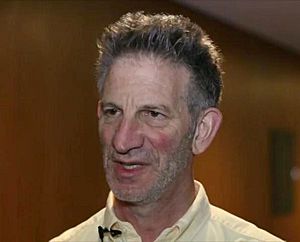Peter Sarnak facts for kids
Quick facts for kids
Peter Sarnak
FRS MAE
|
|
|---|---|
 |
|
| Born |
Peter Clive Sarnak
18 December 1953 Johannesburg, South Africa
|
| Nationality | South Africa United States |
| Alma mater | University of the Witwatersrand (BSc) Stanford University (PhD) |
| Known for | Systolic geometry Hafner–Sarnak–McCurley constant |
| Awards | George Pólya Prize (1998) Ostrowski Prize (2001) Levi L. Conant Prize (2003) Cole Prize (2005) Wolf Prize (2014) Sylvester Medal (2019) Shaw Prize (2024) |
| Scientific career | |
| Fields | Mathematics |
| Institutions | Courant Institute New York University Stanford University Princeton University Institute for Advanced Study |
| Thesis | Prime geodesic theorems (1980) |
| Doctoral advisor | Paul Cohen |
| Doctoral students |
|
Peter Clive Sarnak is a famous mathematician from South Africa and the United States. He was born on December 18, 1953. He is known for his important work in a field called analytic number theory. This area of math uses tools from analysis (a type of advanced calculus) to study numbers, especially prime numbers.
Since 2007, Peter Sarnak has been a permanent professor at the Institute for Advanced Study. This is a very special place where top scientists and mathematicians do research. He is also a professor at Princeton University since 2002. He helps edit the Annals of Mathematics, which is a major math journal.
Contents
Education and Early Life
Peter Sarnak's grandfather was a rabbi in Johannesburg, South Africa. Peter himself lived in Israel for three years when he was a child.
He went to the University of the Witwatersrand in South Africa. He earned his first degree there in 1975. Later, he went to Stanford University in the United States. In 1980, he earned his PhD, which is a very high degree, under the guidance of a famous mathematician named Paul Cohen.
Peter Sarnak's early research involved using ideas from number theory to study special graphs called Ramanujan graphs. This work connected math to other fields like combinatorics (the study of counting and arrangements) and computer science.
Contributions to Mathematics
Peter Sarnak has made many important discoveries in analysis and number theory. He is considered one of the best analytic number theorists of his time.
One of his early achievements was proving something about "cusp forms." This helped to disprove an idea that another mathematician, Atle Selberg, had. He also found the strongest known limits for the Ramanujan–Petersson conjectures, which are ideas about certain mathematical patterns.
Sarnak was one of the first to see how some ideas in theoretical physics could be connected to analytic number theory. He even came up with the term arithmetical quantum chaos. This field looks at how chaos and randomness appear in mathematical systems related to numbers. He also studied how random matrix theory relates to the zeros of L-functions. L-functions are special mathematical functions that are very important in number theory.
His work on something called "subconvexity for Rankin–Selberg L-functions" helped solve Hilbert's eleventh problem. This was one of a list of 23 big math problems that a famous mathematician, David Hilbert, posed in 1900.
Where He Has Worked
Throughout his career, Peter Sarnak has taught and researched at several top universities:
- From 1980 to 1983, he was an Assistant Professor at the Courant Institute at New York University. He later became a full Professor there.
- From 1984 to 1991, he was a professor at Stanford University.
- Since 1991, he has been a professor at Princeton University. He became the Eugene Higgins Professor in 2002.
- Since 2007, he has been a faculty member at the Institute for Advanced Study.
Key Publications
Peter Sarnak has written or helped edit many important math books and papers. Some of these include:
- Some Applications of Modular Forms (1990)
- Random Matrices, Frobenius Eigenvalues and Monodromy (1998)
- Elementary Number Theory, Group Theory and Ramanujan Graphs (2003)
Awards and Honors
Peter Sarnak has received many prestigious awards for his mathematical work:
- 1988: Pólya Prize
- 2001: Ostrowski Prize
- 2003: Levi L. Conant Prize
- 2005: Frank Nelson Cole Prize in Number Theory
- 2012: Lester R. Ford Award
- 2014: Wolf Prize in Mathematics (a very high honor in math)
- 2019: Sylvester Medal from the Royal Society
- 2024: Shaw Prize (another major international award)
In 2014, his old university, the University of the Witwatersrand, gave him an honorary doctorate. This was to recognize his amazing contributions to mathematics.
He has also been invited to speak at the International Congress of Mathematicians (ICM) multiple times. This is a big meeting where mathematicians from all over the world share their latest discoveries.
Peter Sarnak is a member of several important academic groups, including the American Academy of Arts and Sciences (since 1991) and the National Academy of Sciences (since 2002). He also became a Fellow of the Royal Society (FRS) in 2002. In 2019, he was the tenth person who was not British to receive the Sylvester Medal.
 | Georgia Louise Harris Brown |
 | Julian Abele |
 | Norma Merrick Sklarek |
 | William Sidney Pittman |

